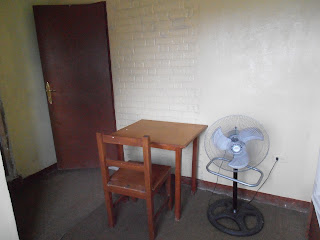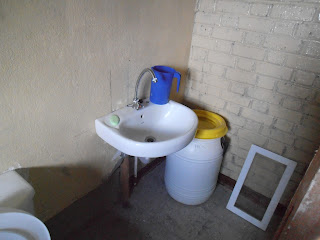I had an unexpected surprise this fall when I was invited to be part of a two-week mission trip to Liberia that was organized by the Liberian Ministers Association (LMA) of Minnesota. I was overwhelmed with excitement of the possibility of going back to Liberia, but was also faced with having limited funds and little time to prepare. So, I took the bold step and found 19 thoughtful and generous sponsors who helped me with my travel expenses. Fortunately, our team was able to minimize our accommodation expenses so I donated 20% of what I raised to the LMA for the mission's purpose, a Healing and Reconciliation Conference.
Now many of you might be shaking your head and wondering what this post is about since I had not publicly announce this trip to Liberia. This was clearly not a leisure trip and it did not allow much free time to visit my friends in Liberia. So, I apologize for those who are reading about this for the first time and hope that you will forgive me.
This trip was my shortest, but also had some interesting twists. I landed in Liberia on October 30 without my two checked bags--one was donated to the medical team from Community of Angels and the other was my clothes and personal items. These bags somehow decided to travel the world and had stops in Paris, Casablanca and who knows where else. This was not a pleasant surprise, but fortunately my team mates were able to supply me with some clothes as the saga of the missing luggage lingered for the next ten days. To keep this story brief, the donated bag was picked up on November 2 and I received my bag on November 9, which I was leaving in four days.
Luckily one of my strengths is adaptability, and I was able to make the most of the rest of my trip without my things. We spent the majority of the first week in Kakata, a small city about 90-minute drive from Monrovia (Liberia's Capital City). For seven nights we stayed at the Booker Washington Institute (BWI) Guest House just on the outskirts of Kakata. This institution was founded in the same spirit as the Tuskegee Institute in Alabama by its founder Dr. Booker T Washington.
The following 12 pictures are of the campus and my guest room:
One of the main highlights of our trip was meeting the U.S. Ambassador--Linda Thomas-Greenfield--to Liberia. As one of my first assignments, I was able to arrange our meeting for October 31 prior to our departure. Since our team was so large, we met at the Public Diplomacy Building on the second floor in the Colin Powell Conference Room. This change in venue meant that there was minimal security and the opportunity for photographs. Here is a picture of our group with Ambassador Thomas-Greenfield.
This was an insightful meeting, because the Ambassador shared with us about their activities with the elections. They had been actively engaged with the young people sensitizing them on the meaning of democracy and how their vote should not be bought or manipulated. She and her staff kept in close contact with many youth leaders so that they could diffuse any non-peaceful acts being instigated by any of the political parties.
The Ambassador also mentioned that she and her staff were part of the many observers of the October 11 Election at some 50 voting sites. She personally oversaw the vote count at Waterside, which is a section of the City of Monrovia. She was quite dismayed by the accusations of voter fraud when each site had both national and international observers present to ensure transparency with the counting.
She also shared some of the other activities the Embassy has been involved in. One of the main ones is education. They had about 39 Peace Corp Volunteers with all but four teaching in 24 high schools in Liberia. These volunteers were also training and certifying Liberian teachers.
The Peace Corp's return to Liberia in 2008 was one of many signs that the peace is progressing in the right direction. The Peace Corp had served faithfully in Liberia from 1962 to 1990, but were disbanded during the civil war. Another positive sign that was shared by Ambassador Thomas-Greenfield was the return of the families to the Embassy. Her face lit up when she commented on the number of babies that have been born to the staff members and how nice it was to have children back at the Embassy.
The Ambassador stressed one interesting point that aligned with our mission's purpose--healing and reconciliation. She stated that most, if not all, Liberians were dealing with trauma issues. This prompted me to remember an article I had read over a year ago titled "One Psychiatric Hospital for 3 Million People, Liberia Plan for Change." So, I asked her "isn't there one psychiatrist for the entire nation?" Her response was that person was not practicing, because he was working at the Ministry of Health and Social Welfare. This inspired one of our team members, the LMA's current executive director, to reconsider getting his PhD in psychology.
Clearly, 14 years of civil war would not only leave physical scars, but also mental ones. This reality made our mission to promote healing and reconciliation even more important. The task at hand was not easy, because the elections opened some old wounds and those hurts still impact the lives of many Liberians.
This is where I will conclude this post. Next week, I will continue with part 2 and share more about our conferences in Kakata and Monrovia. Until then, peace to all!
Now many of you might be shaking your head and wondering what this post is about since I had not publicly announce this trip to Liberia. This was clearly not a leisure trip and it did not allow much free time to visit my friends in Liberia. So, I apologize for those who are reading about this for the first time and hope that you will forgive me.
This trip was my shortest, but also had some interesting twists. I landed in Liberia on October 30 without my two checked bags--one was donated to the medical team from Community of Angels and the other was my clothes and personal items. These bags somehow decided to travel the world and had stops in Paris, Casablanca and who knows where else. This was not a pleasant surprise, but fortunately my team mates were able to supply me with some clothes as the saga of the missing luggage lingered for the next ten days. To keep this story brief, the donated bag was picked up on November 2 and I received my bag on November 9, which I was leaving in four days.
Luckily one of my strengths is adaptability, and I was able to make the most of the rest of my trip without my things. We spent the majority of the first week in Kakata, a small city about 90-minute drive from Monrovia (Liberia's Capital City). For seven nights we stayed at the Booker Washington Institute (BWI) Guest House just on the outskirts of Kakata. This institution was founded in the same spirit as the Tuskegee Institute in Alabama by its founder Dr. Booker T Washington.
The following 12 pictures are of the campus and my guest room:
Entrance to BWI
The main building near the entrance
View of the campus
Another view of the campus
And another view of the campus
BWI Guest House. My room was on the second floor on the
left side...the air conditioner was not hooked up.
Second floor dining room where we had our breakfast and evening meals, which
were prepared by the some of the pastors' wives in the community.
Second floor living room where had our morning meetings
The room I shared with another team member
I am always happy when there is fan.
Bathroom with running water
The water pressure was quite low, so bucket baths were the way to go
One of the main highlights of our trip was meeting the U.S. Ambassador--Linda Thomas-Greenfield--to Liberia. As one of my first assignments, I was able to arrange our meeting for October 31 prior to our departure. Since our team was so large, we met at the Public Diplomacy Building on the second floor in the Colin Powell Conference Room. This change in venue meant that there was minimal security and the opportunity for photographs. Here is a picture of our group with Ambassador Thomas-Greenfield.
This was an insightful meeting, because the Ambassador shared with us about their activities with the elections. They had been actively engaged with the young people sensitizing them on the meaning of democracy and how their vote should not be bought or manipulated. She and her staff kept in close contact with many youth leaders so that they could diffuse any non-peaceful acts being instigated by any of the political parties.
The Ambassador also mentioned that she and her staff were part of the many observers of the October 11 Election at some 50 voting sites. She personally oversaw the vote count at Waterside, which is a section of the City of Monrovia. She was quite dismayed by the accusations of voter fraud when each site had both national and international observers present to ensure transparency with the counting.
She also shared some of the other activities the Embassy has been involved in. One of the main ones is education. They had about 39 Peace Corp Volunteers with all but four teaching in 24 high schools in Liberia. These volunteers were also training and certifying Liberian teachers.
The Peace Corp's return to Liberia in 2008 was one of many signs that the peace is progressing in the right direction. The Peace Corp had served faithfully in Liberia from 1962 to 1990, but were disbanded during the civil war. Another positive sign that was shared by Ambassador Thomas-Greenfield was the return of the families to the Embassy. Her face lit up when she commented on the number of babies that have been born to the staff members and how nice it was to have children back at the Embassy.
The Ambassador stressed one interesting point that aligned with our mission's purpose--healing and reconciliation. She stated that most, if not all, Liberians were dealing with trauma issues. This prompted me to remember an article I had read over a year ago titled "One Psychiatric Hospital for 3 Million People, Liberia Plan for Change." So, I asked her "isn't there one psychiatrist for the entire nation?" Her response was that person was not practicing, because he was working at the Ministry of Health and Social Welfare. This inspired one of our team members, the LMA's current executive director, to reconsider getting his PhD in psychology.
Clearly, 14 years of civil war would not only leave physical scars, but also mental ones. This reality made our mission to promote healing and reconciliation even more important. The task at hand was not easy, because the elections opened some old wounds and those hurts still impact the lives of many Liberians.
This is where I will conclude this post. Next week, I will continue with part 2 and share more about our conferences in Kakata and Monrovia. Until then, peace to all!













